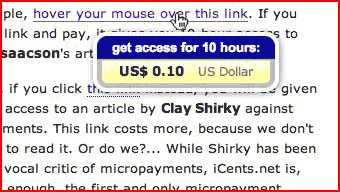Landing on a Dime?
 I honestly have no idea if this will fly or not, knee-deep as I am in the graphic novel, but iCents is at least offering a novel approach in some respects and if anyone out there wants to give it a closer look and offer your thoughts, I’d be curious to hear them.
I honestly have no idea if this will fly or not, knee-deep as I am in the graphic novel, but iCents is at least offering a novel approach in some respects and if anyone out there wants to give it a closer look and offer your thoughts, I’d be curious to hear them.
Still having the tar and feathers from last time removed, so I’ll stay on the sideline regarding the more general debate about micropayments that’s been flairing up again recently (at least for now).
More importantly, the whole world is still busy sorting out whether there will even be intellectual property in a decade or two, so the question of what kinds of new industries it might generate could be on a lot of peoples’ back burners a while longer.
[Update: Marc Glasberg from iCents has hopped onto the comments section and has some illuminating answers for those interested in learning more about the system.]














Ok, I’ll bite; if there were no intellectual property, how would folks make money with things such as self-published comics? How would the ‘little person’ benefit from there not being IP? How would bog corps? I know the success of “Sita Sings the Blues” (something you should look into if you haven’t) is wonderful but is also a current fluke and also works partially because of the ‘honor system.’ Are you advocating people letting go of any kind of sense of ownership?
What amount defines a micropayment? If it’s anything less than a dollar, I’d say that iTunes and Rifftrax do quite well with them. :”D
Whoa! Hang on, Mike. I think you misread the last paragraph.
I’m not ADVOCATING abolishing IP (I make my living from IP for Pete’s sake!~), I’m just saying that’s one of the big question marks hanging over any paid content debate in 2009. No one, including me, knows which way that particular wind will eventually blow.
I’ll see if I can revise that paragraph slightly to make it clearer.
Nah, it’s probably just me that got it wrong. You had me intrigued, though!
[…] Wait: I thought that micropayments were dead…? […]
I’ve been thinking about why micropayments never took off. From a personal perspective, I’ve supported about a dozen webcomic artists by buying books, prints, t-shirts, etc., but never paid for the privilege to read the comic in the first place. My conjecture is related to the 2002 Nobel prize in economics (http://nobelprize.org/nobel_prizes/economics/laureates/2002/press.html), namely that uncertainty creates a psychological cost that dissuades the potential reader from purchasing even though, from a purely monetary perspective, the reader ordinarily would.
Personally, I think the idea of offering free content, and then using micropayments for additional content (or ad-free content!), would work out very nicely for a lot of online artists. After a brief look at iCents, though – I like the idea! But I’m seeing a lot of holes in their approach.
The biggest problem is the fact that it is based entirely around the link – and banking on people having Javascript and cookies enabled. (They skirt this in their FAQ by saying “most users” don’t disable those functions. Hmm…) So what happens if a user right-clicks and says “Open link in new window”? Boom, instant content, payment bypassed. Same if they type in the URL directly, or have it sent by a friend.
This concept is a beautiful castle – built on sand. 🙁
@Nightlyre:
This is Marc Glasberg, CEO of iCents.net. Please see my reply to your post below (I misplaced it).
…The access control is done server-side, and is therefore independent of JavaScript. There is no way around it. (see the complete answer below).
There will always be ways around stuff.
Most comics can be torrented easily enough.
The key is to make it slightly more bother then the small micropayment is worth.
Imho, if you have a really easy payment system, you dont actually need massively secure systems.
I agree with “jgf” that uncertainty creates a psychological cost.
Unless there’s a broad shift in the way we think about online content, everyone on the internet is going to continue to give work away for free and hope to find a niche. It’s like an endless sidewalk of street performers and the audience will toss their pennies to the ones they most enjoy. No reason to buy sight unseen.
Of course, it’s important to remember that it’s a privilege and honor to do what you enjoy for a living. Even if it isn’t much of a living. Especially when it may not have as much apparent utility as growing a potato or unclogging the sewers.
“. No reason to buy sight unseen.”
But people already -do-.
Cinemas,DVDs, TV shows…all either directly on indirectly paid for before you view them.
If the costs are low, or the recommendations are high enough, people are willing to fork out money up-front.
Of course, free-samples (comics, games, whatever), help a lot to hock people into the artists work. But in principle I think people dont have any problem paying before if the “risk” is low.
And when your talking about a 1-off payment of 10cents or something, its low indeed.
Id know Id happy at least try a lot of online content if it was quick and cheap to pay for.
I’d also hope a lot more independent tv/films (Dr Horrible etc) start basing themselves around this system.
Pat:
You don’t need to wait until people stop giving work away for free (specially because this will never happen). Lots of web companies, like iTunes and gaming websites, are already selling lots of content.
In this essay I discuss a strategy, which I call “Virtual Perimeters”, that you can use to “protect” yourself from free content:
http://www.icents.net/en/website/TheNewCaseForMicropayments2009.html
I won’t go into much detail here, but, quoting myself:
“A Virtual Perimeter is just a very good way to protect some of your website features from the profit margin destruction created by the Internets’ wonderful efficiencies of scale and distribution. A Virtual Perimeter is an Internet hack.”
It is very difficult for an individual author to create a virtual perimeter, and in my opinion this is the reason why Scott couldn’t sell enough “The Right Number”s years ago. But a websites that gather individual authors with the right Freemium strategy can do it, even if other competing websites are giving content away for free. For example, I believe a company like TakeComics could do it:
http://www.takecomics.com/
– Marc.
@Nightlyre:
Hi, I’m Marc Glasberg, CEO of iCents.net.
iCents is not based entirely around the link, but it is entirely our fault that you got this idea. We will immediately change our website to explain it better.
iCents is composed of two parts. The first part is creating paid-links (micropayments and/or micro-subscriptions), and you can already do it very easily by following the instructions on iCents website.
The second part is controlling access. The reason why you can access the URL directly is because there is no access control there yet.
We are finishing the development of the access control part, and in fact you will be able to do it in a number of ways. The easiest one, in my opinion, will be to install the software we’ll provide, and then define your own naming convention. Our default (that you may change) is that all URLs that contain the term “-pay” should be controlled by the server. For example, a protected URL could be named:
http://scottmccloud.com/comics/comic01-pay.html
or
http://scottmccloud.com/comics-pay/comic01.html
This will be enough to control access! As you can see, it is easy to protect a whole folder, or a single file, since the “-pay” can be anywhere within the URL.
The access control is done server-side, and is therefore independent of JavaScript.
If you have any other questions, please feel free to ask.
Cheers,
Marc Glasberg
Just had a quick browse of your site, and the system seems really good. At least, it ticks all the right boxs.
I’m a little confused how you get around the fundamental problem of low-payments costing too much to administrate though? Without acting as a “buffer” isnt most of a 10cent payment going straight to Paypal (or whoever) ?
@Darkflame:
iCents takes a double approach.
– If the payment system can directly handle the paid amount, we simply transfer directly.
– If the payment system cannot directly handle the paid amount, we act as a “buffer”, as you say, to agreggate payments.
It’s the payment system’s decision if they want us to help or not.
Apart from that, our technology was designed to be economically efficient and very fast, even when you handle 1 single cent. Two weeks ago we got our first patent on this technology. Go to the USPTO (http://patft.uspto.gov/netahtml/PTO/srchnum.htm) and search for patent 7,596,530.
That sounds just perfect then. I wouldn’t have thought we would have a microtransaction system that can go so long so soon.
I’m a big believer in the principle. Partly because it can get the internet of the “one-legged” supported of advertising, and partly because it will allow bigger and more interesting things to be made purely for the online market.
So I’m really glade a company has rised to the challange!
Hi Marc,
I really appreciate you taking the time to reply and address the concerns I had. It sounds like you will have a good system in place to handle direct URL requests, and I will definitely keep an eye on the site for future developments.
Thanks again!
This is really interesting. This looks so simple and easy I don’t think people will notice the coming change. It is something I am eager to try once. I really hope Mr. McCloud changes his mind on being on the side lines however, he REALLY is the most credible dissenting voice on this matter.
Over the course of each of our 20 year careers in payments, I think my partners and I have been involved in just about every micropayment system out there (Visa Cash in the 90s, BitPass, CyberCash, CyberGold, Millicent, etc.). I’ll stay out of the debate of whether the market actually needs one or not (i.e., whether subscription models are good enough for the big content sites, the pros and cons of prepaid, etc.) What’s left is the underlying issue of cost of getting money into the system with Visa/MC.
Visa and MC’s current interchange fees make micro transactions pretty expensive on a per txn basis. PayPal and some others already offer a 5% + 5 cent per txn price. If that’s too high and/or someone feels they need to accept Visa/MC in their “native form”, then you’re left with having people prepay (spreading the transaction processing costs out over more transactions), aggregating txns, etc.
This is not to take anything away from, or even comment on the iCents solution — just laying out some of the friction the prior efforts have had to overcome from a payments cost perspective